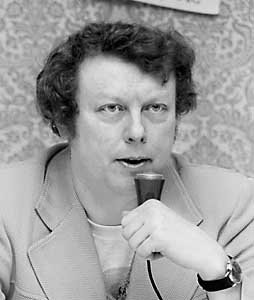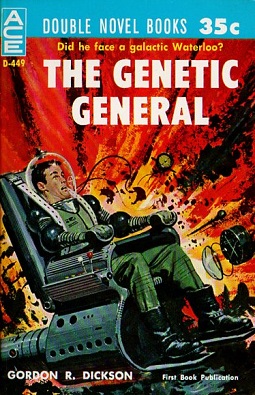
Gordon Rupert Dickson was a Canadian-American science fiction writer. He was inducted into the Science Fiction and Fantasy Hall of Fame in 2000.
The Childe Cycle is an unfinished series of science fiction novels by Canadian writer Gordon R. Dickson. The name Childe Cycle is an allusion to "Childe Roland to the Dark Tower Came", a poem by Robert Browning, which provided inspiration for elements in the work. The series is sometimes referred to as the Dorsai series, after the Dorsai people who are central to it. The related short stories and novellas all center on the Dorsai, primarily members of the Graeme and Morgan families.

The Magic Goes Away is a fantasy short story written by Larry Niven in 1976, and later expanded to a novella of the same name which was published in 1978. While these works were not the first in the "Magic Universe" or "Warlock" series, they marked a turning point after the 1973 oil crisis and Niven's subsequent transformation of the series into an allegory for a modern-day energy crisis. The setting was later used as a backdrop for the Golden Road series of novels The Burning City and Burning Tower, co-written with Jerry Pournelle, and the novel The Seascape Tattoo co-written with Steven Barnes.

"Childe Roland to the Dark Tower Came" is a narrative poem by English author Robert Browning, written on January 2, 1852, and first published in 1855 in the collection titled Men and Women. The poem is often noted for its dark and atmospheric imagery, inversion of classical tropes, and use of unreliable narration. Childe Roland, the only speaker in the poem, describes his journey towards "the Dark Tower", and his horror at what he sees on his quest. The poem ends when Roland finally reaches the tower, leaving his ultimate fate ambiguous.

Soldier, Ask Not is a science fiction novel by American writer Gordon R. Dickson, published in 1967 by Dell Publishing company. It is also the title of a novella which appeared in the October, 1964 issue of Galaxy Science Fiction magazine. The shorter work constitutes about one third of the novel.
Sandra Louise Miesel in New Orleans) is an American medievalist, writer, editor and fiction critic. Her early work was in science fiction and fantasy criticism, while her later writings focus on religious critiques.
Donal Graeme is a fictional character in the Childe Cycle of science fiction novels by Gordon R. Dickson.

Tactics of Mistake is a science fiction novel by American writer Gordon R. Dickson, first published as a serial in Analog in 1970-1971. It is part of Dickson's Childe Cycle series, in which mankind has reached the stars and divided into specialized splinter groups. The fourth book written, it is chronologically the second book of the cycle, occurring roughly a century after Necromancer, and a century before Dorsai!. The primary character, Cletus Grahame, is the ancestor of the key characters in later works: the twins, Ian and Kensie Graeme, and their nephew, Donal Graeme.

The Psychotechnic League is a future history created by American science fiction writer Poul Anderson. The name "Psychotechnic League" was invented by Sandra Miesel during the early 1980s, to capitalize on Anderson's better-known Polesotechnic League future history. Anderson published 21 novels, novellas and short stories set in this future between 1949 and 1957, with a 22nd published in 1968.

Dorsai! is the first published book of the incomplete Childe Cycle series of science fiction novels by American writer Gordon R. Dickson. Later books are set both before and after the events in Dorsai!.
The 39th World Science Fiction Convention (Worldcon), also known as Denvention II, was held on 3–7 September 1981 at the Sheraton Denver Downtown Hotel in Denver, Colorado, United States.
The complete bibliography of Gordon R. Dickson.

The Spirit of Dorsai is a collection of two science fiction stories by American writer Gordon R. Dickson. It was first published by Ace Books in 1979. The collection includes linking material and the stories are part of Dickson's Childe Cycle. The first story, "Amanda Morgan", is original to this collection. The other, "Brothers", originally appeared in the anthology Astounding, edited by Harry Harrison.

Lost Dorsai is a collection of science fiction stories by Gordon R. Dickson from his Childe Cycle series. It was first published by Ace Books in 1980. The collection includes two stories that originally appeared in the anthology series Destinies, one that appeared in the magazine Analog Science Fiction and Fact and an excerpt from Dickson's novel The Final Encyclopedia.

Dickson! is a collection of science fiction stories by American writer Gordon R. Dickson. It was first published by NESFA Press in 1984 and was issued in honor of Dickson's appearance as guest of honor at the 42nd World Science Fiction Convention. Most of the stories originally appeared in the magazines SFWA Bulletin, Astounding, Analog Science Fiction and Fact, Ellery Queen's Mystery Magazine and Science Fiction Stories. The book contains introduction to each story by Sandra Miesel.

Steel Brother is a collection of science fiction stories by Gordon R. Dickson. It was first published by Tor Books in 1985 and reprints most of the stories from Dickson's 1984 collection Dickson!, with one substitution and one added interview. The stories originally appeared in the magazines SFWA Bulletin, Astounding, Galaxy Science Fiction, Analog Science Fiction and Fact, Ellery Queen's Mystery Magazine and Science Fiction Stories. The book contains the introduction to each story by Sandra Miesel from the previous collection, though they are not credited.

The Dorsai Companion is a collection of science fiction stories by American writer Gordon R. Dickson, part of his Childe Cycle series. It was first published by Ace Books in 1986. The collection includes a number of articles by Sandra Miesel.
Amanda Morgan is a science fiction novella by American writer Gordon R. Dickson, first published in The Spirit of Dorsai in 1979 and later included in The Dorsai Companion in June 1986. The story is set in 2185 on the Dorsai, a key planet and Splinter Culture of Dickson's future history known as the Childe Cycle. "Amanda Morgan" is a perspective piece expanding and illuminating the crisis of the novel Tactics of Mistake, in which the planet known as The Dorsai is attacked for the sake of defeating Cletus Grahame. Amanda Morgan, also known as the first Amanda, leads the resistance in Grahame's home district. The theme of the story may be understood as: Moral strength is more important than physical strength in the struggle for identity.

The Final Encyclopedia is a science fiction book by Gordon R. Dickson published in 1984. It is part of the Childe Cycle series. The Final Encyclopedia transitions from the militaristic action-adventure of the earlier books in the Childe Cycle to a philosophical commentary on the evolution of humankind.

The Outposter Is a space opera science fiction novel by Gordon R. Dickson first published as serialized magazine story in 1971, and later published as a book in 1972. The story follows Mark Ten Roos, the leader of a group of planetary colonists pushed out from an overcrowded Earth and their attempt to successfully settle in another planet, pursing a daring plan to become economically self-sufficient from Earth, as well as to develop their own capacity to defend themselves from the threat of an alien race of raiders.













